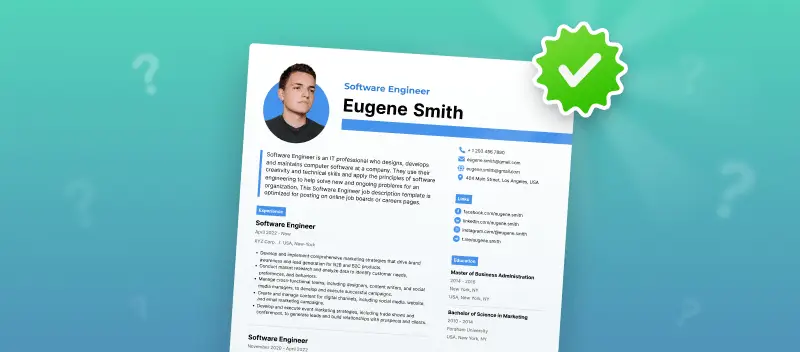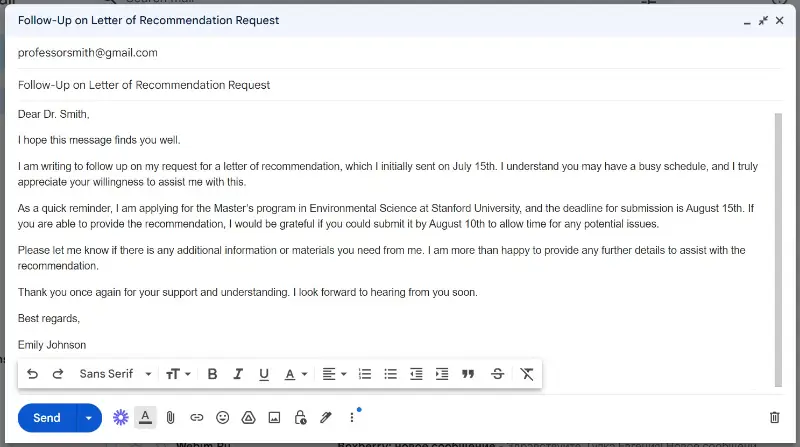Explaining your departure from a toxic job on your resume can be challenging, but it’s an important part of showcasing your professionalism and maturity.
Employers understand that not every vacancy is a perfect fit, and they may be curious about the circumstances that led to your decision to quit. By approaching how to explain leaving a negative work environment on application, you can turn a potentially awkward topic into an opportunity to highlight your strengths.
What is a toxic job?
It refers to an atmosphere that consistently harms your mental, emotional, or physical health.
While occasional stress is normal, a toxic workplace creates long-term negative effects on employees.
Negative work environment examples:
- Unhealthy balance. People may be expected to act long hours or be constantly available, with little regard for their personal time.
- Lack of support. Workers often feel neglected, without adequate mentorship or direction.
- Hostile atmosphere. A toxic establishment often breeds competition to the point of backstabbing or gossip, fostering a sense of animosity among colleagues.
- Micromanagement. When leaders excessively control every detail, it can sense suffocating and prevent from taking initiative or feeling empowered.
- Poor communication. If there’s a lack of transparency or unclear expectations, employees can feel lost and uncertain about their roles.
- Frequent turnover. High attrition is common, as workers leave due to dissatisfaction, which in turn worsens the environment for those who remain.
- Discrimination. A toxic job might include harassment or unethical practices, which make individuals discern unsafe or unsupported.
How to say you left a job because it was toxic on a resume?
When it comes to addressing the reason for leaving toxic work environment on your application, you want to be strategic about where and how you present this info.
You generally won't go into extensive detail in the resume itself, as this document should focus more on your skills, experience, and accomplishments. However, there are a few places where you can subtly include the cause for your departure.
- Under each title
This approach avoids negative language while showing that you were seeking a healthier workplace that would align better with your values.
Examples:
Marketing Manager — Facebook (2019-2022)
- Led a team of 10 in executing marketing campaigns for new product launches, resulting in a 25% increase in revenue.
- Managed client relationships and developed strategic partnerships that enhanced brand visibility.
- Transitioned from Facebook due to a misalignment with culture, seeking a more collaborative and growth-oriented environment.
Sales Associate — Salesforce (2017-2019)
- Developed sales strategies that led to a 15% increase in customer retention and a 10% boost in overall sales.
- Provided training and mentoring to new sales representatives.
- Left to pursue a role at a company with a more supportive and inclusive culture that encourages professional development.
By framing your reason for leaving this way, you stay focused on your growth and the positive steps you took toward a better opportunity.
- Summary
You can subtly mention your departure in the opening statement, using a firm name for context while keeping the explanation general.
Example:
"Experienced sales professional with a proven track record at Google and Microsoft. After evaluating my career trajectory at Google, I chose to transition to new opportunities where I could thrive in a more team-oriented environment that encourages innovation."
This method communicates that your leaving a job due to toxic environment was a thoughtful decision based on aligning your goals with the right workplace.
Create your professional Resume in 10 minutes for FREE
Build My Resume
- Cover letter
Your letter gives you more space to explain your departure from a toxic job in a way that outlines your commitment to finding a better fit.
Example:
"In my role at Tesla, I experienced a significant misalignment between my personal values and the culture, which ultimately led to a decision to seek a new opportunity. I am now looking for a company like yours, one that fosters an inclusive work culture, where I can contribute meaningfully."
Here, you acknowledge the issue directly but focus on the positive aspects of what you’re seeking in the future.
How to explain a toxic work environment in interview?
1. Focus on what you learned
Instead of underlining negative experiences, emphasize what you gained from the situation and how you grew from it. This approach shows maturity and a constructive mindset.
Example of how to explain leaving a negative work environment:
"During my time at Uber, I gained valuable skills, particularly in navigating high-pressure situations and managing complex projects. However, as the company scaled rapidly, I noticed that the work environment became increasingly competitive, and team collaboration started to deteriorate. Over time, it became challenging to maintain a sense of teamwork and mutual support, which are values I hold dear. I realized that in order to continue developing professionally, I needed to find a role where a more balanced work culture was prioritized."
2. Avoid criticizing
It's important to refrain from blaming specific people or groups. Instead, focus on systemic issues that impacted the overall work culture. This shows professionalism and that you can handle adversity without resorting to finger-pointing.
Example of how to explain why you left a toxic job:
"At Amazon, I found myself in an environment where there was a lot of pressure for quick results, often without sufficient guidance or recognition. While I understood the demands of the role, I began to feel that the firm's approach led to high levels of burnout. As a result, it became increasingly difficult to stay motivated. I decided to move on because I was looking for long-term career development are prioritized alongside performance."
3. Emphasize your desire for growth
Frame your decision to leave as one motivated by the wish for advancement and finding a role that is more aligned with your ambitions.
Example of how to say you left a job because it was toxic:
"At Tesla, I had the opportunity to work on innovative projects and expand my technical skills, which I greatly appreciated. However, I soon realized that the company’s fast-paced and demanding environment did not leave room for personal development. I believe in continuous learning, and when I saw that there were limited opportunities to advance, I decided to explore other opportunities where I could be challenged and develop further in a healthier environment."
4. Be honest
While honesty is important, be sure to build your response in a way that focuses on the factors that led you to leave, without sounding resentful.
Example of reason for leaving toxic work environment:
"At Google, I was fortunate to work with a team that was driven and talented. However, over time, the organization’s growth led to shifts in leadership that created an environment where communication was fragmented. There was less collaboration between teams. I thrive in environments where there is transparency, and when I saw that those aspects were becoming less common, I decided it was time to transition."
5. Highlight what you are looking for
Emphasize on the positive qualities you're seeking in your next role.
Example of how to explain a toxic work environment:
"I’m searching for an organization like Salesforce, where I can contribute to a culture that values inclusivity, mentorship, and collaboration. After experiencing the challenges of working in a place that didn't foster a sense of community, I’ve realized how important it is for me to be part of a team that thrives on support and open dialogue. I’m particularly drawn to your company's strong commitment to professional development and creating a work environment that encourages creativity and respect."
6. Keep it concise
You don’t need to dwell on the negative aspects of your previous role. Rather keep the conversation focused on your readiness for the next opportunity.
Example of how to explain why you left a toxic job:
"At Microsoft, I gained extensive experience and worked with some incredibly talented individuals. However, over time, the company’s rapid growth led to a shift in its internal culture that no longer aligned with my values. I am excited to find a role where team synergy and a supportive, growth-oriented culture are key priorities."
How to explain a toxic work environment - resume examples
Technology industry
John Dorel
john.dorel@gmail.com | (555) 123-4567 | San Francisco, CASummary
Skilled software engineer with experience in full-stack development. Passionate about creating efficient, scalable web applications and collaborating with cross-functional teams. Seeking to join an organization that promotes transparency, teamwork, and employee well-being.
Professional Experience
Software Engineer
Google – Mountain View, CA
June 2022 – Present
- Develop and maintain web applications for internal tools and customer-facing platforms.
- Collaborate with design, product, and operations teams to ensure product success.
- Mentor junior developers, ensuring the team follows best practices and code quality standards.
- Leave due to an overwhelming and constantly shifting workload with unclear priorities. The lack of communication and leadership made collaboration difficult, leading to high stress levels. I am now looking for an opportunity in an organization that emphasizes work-life balance and employee support.
Software Engineer
Meta (formerly Facebook) – Menlo Park, CA
March 2019 – May 2022
- Built and maintained backend systems to support high-traffic applications with millions of users.
- Participated in scaling infrastructure to handle 50% more traffic during high-demand periods.
Education
Bachelor of Science in Computer Science
University of California, Berkeley
Graduated May 2018
Certifications
- AWS Certified Solutions Architect – Associate, Issued June 2021
- Certified Kubernetes Administrator (CKA), Issued March 2020
Skills
- Programming Languages: JavaScript, Python, Java, SQL
- Frameworks/Technologies: React, Node.js, Docker, Kubernetes
- Cloud Platforms: AWS, Google Cloud Platform
- Tools: Git, Jenkins, Jira
Marketing industry
Sarah Smith
sarah.smith@gmail.com | (555) 987-6543 | New York, NYSummary
Digital Marketing Manager with experience in managing multi-channel campaigns, SEO/SEM, and brand strategy. Expertise in leveraging data to drive results, fostering team collaboration, and executing creative campaigns. Looking to join a company that values employee growth and a balanced work environment.
Professional Experience
Digital Marketing Manager
HubSpot – Cambridge, MA
August 2022 – Present
- Lead SEO and paid media campaigns to drive brand awareness and revenue growth for clients.
- Analyze data and adjust strategies to optimize campaign performance and ROI.
- Manage a team of digital marketing specialists, focusing on skills development and strategy execution.
- Depart due to a lack of support from leadership and an environment that favored individual competition over collaboration. The stress of meeting constantly shifting goals led to burnout. I am seeking a role in a company that encourages teamwork and prioritizes employee health.
Digital Marketing Lead
Comcast – Philadelphia, PA
January 2020 – July 2022
- Managed PPC campaigns with an average monthly spend of $150K, achieving a 25% increase in conversion rates.
- Developed content strategies that increased organic traffic by 30% over six months.
Education
Bachelor of Arts in Marketing
New York University
Graduated May 2016
Certifications
- Google Ads Certification, Issued October 2021
- HubSpot Inbound Marketing Certification, Issued April 2020
Skills
- SEO/SEM, PPC Campaigns, Content Strategy, Brand Management
- Google Analytics, Google Ads, Facebook Ads
- Adobe Creative Suite, WordPress, SEMrush
- Data Analytics, Conversion Rate Optimization
Healthcare
James Taylor
james.taylor@gmail.com | (555) 234-5678 | Chicago, ILSummary
Registered Nurse with experience in providing compassionate, patient-focused care in critical and emergency settings. Adept at fast decision-making, collaboration, and fostering a supportive team environment. Seeking a role in a healthcare facility that values nurse well-being and emphasizes work-life balance.
Professional Experience
Registered Nurse
Northwestern Memorial Hospital – Chicago, IL
June 2021 – Present
- Provide high-quality care to critically ill patients in the ICU, monitoring vital signs and administering medications.
- Work collaboratively with multidisciplinary teams to ensure optimal patient outcomes.
- Mentor new nurses, sharing best practices and providing guidance for professional growth.
Registered Nurse
Rush University Medical Center – Chicago, IL
March 2017 – May 2021
- Assisted in emergency department care, performing assessments, administering medications, and providing critical support during medical procedures.
- Collaborated with a high-performing team to ensure patient safety and comfort in a high-pressure environment.
- Left due to a toxic work culture and constant understaffing, which led to excessive stress and burnout. Seeking a role in a healthcare organization that prioritizes nurse retention and mental health.
Education
Bachelor of Science in Nursing
University of Illinois at Chicago
Graduated May 2016
Certifications
- Basic Life Support (BLS) Certification, Issued July 2022
- Advanced Cardiovascular Life Support (ACLS) Certification, Issued December 2021
Skills
- Critical Care, Patient Monitoring, Emergency Response
- Medication Administration, Patient Advocacy
- Mentorship, Team Collaboration, Electronic Health Records (EHR)
- Leadership and Training, Trauma Care
Retail industry
Emily Jones
emily.jones@gmail.com | (555) 345-6789 | Los Angeles, CASummary
Experienced retail manager with expertise in team leadership, sales, and customer service. Proven ability to enhance operational efficiency, drive sales, and maintain high employee morale. Looking to join a company that fosters employee growth and prioritizes a positive, collaborative work culture.
Professional Experience
Store Manager
Target – Los Angeles, CA
February 2022 – Present
- Oversee daily store operations, ensuring high levels of customer service and operational effectiveness.
- Manage a team of 30+ employees, providing coaching and support to foster a positive work environment.
- Implement inventory management systems, optimize product placement, and ensure compliance with store policies.
- Leave due to a highly stressful work environment with poor communication and lack of leadership support. I am now seeking a role at a company that promotes work-life balance and a supportive culture.
Assistant Store Manager
Walmart – Los Angeles, CA
May 2016 – January 2022
- Managed store operations, including scheduling, inventory management, and merchandising.
- Led a team of 20+ employees, achieving high customer satisfaction scores and maintaining store organization.
Education
Bachelor of Science in Business Administration
University of Southern California – Los Angeles, CA
Graduated May 2015
Skills
- Sales Management, Inventory Control, Employee Training
- Customer Service Excellence, Merchandising, Scheduling
- Retail Software, Leadership, Staff Development
- Conflict Resolution, Process Improvement
Conclusion
Explaining your reason for leaving toxic work environment on a resume can be challenging, but with the right approach, it can be framed positively.
Your application should convey that you are seeking a position where you can contribute meaningfully while working in a collaborative culture. By focusing on your skills, accomplishments, and aspirations, you can confidently address your past while positioning yourself as a strong candidate.
Create your professional Resume in 10 minutes for FREE
Build My Resume















